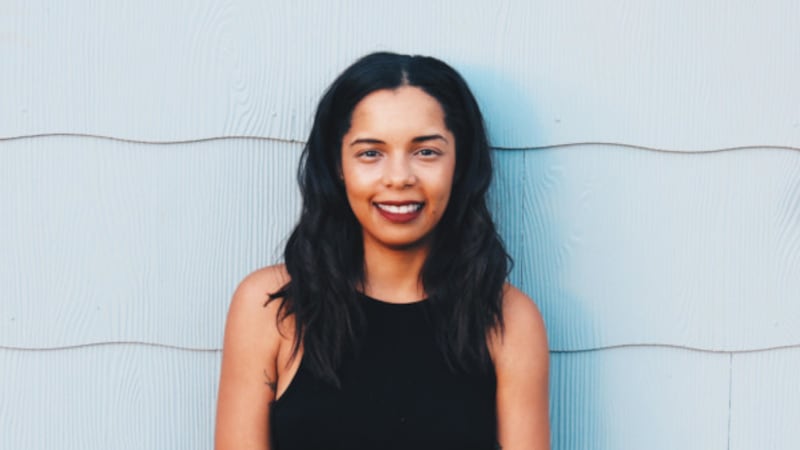In 2012, artist Manuel Arturo Abreu was evicted from Reed College housing after a campus drug raid. After struggling to find a new place to live, Abreu moved into the garage of a punk house in Southeast Portland.
A few years later, Abreu wrote a blog for San Francisco's Museum of Modern Art about the experience. Titled Notes on the Garage Residency, the essay stuck with curator Ashley Stull Meyers ever since she read it. So when she decided to work with Abreu for Place Names, the first exhibit she curated as the director of Art Gym, she knew the garage had to be in the exhibit.
"Mani had written the notes years ago, but had never grappled with it in terms of an exhibition," says Stull Meyers. "It felt to me like it made a lot of sense to include the garage as one of the many places that they're discussing in terms of places for black and brown ingenuity and intellectual freedom, sort of a grappling with your environment in really frustrating ways."
Abreu, whose parents are immigrants from the Dominican Republic, covers a lot of ground in Notes on the Garage Residency, but repeatedly pushed up against the limited language available to those who want to change the way we look at art: "All the West knows as 'art' since the Enlightenment is an ecology of the criteria for inclusion which relies on the colonial subsumption of Black and brown aesthetics."
For Place Names, Stull Meyers suggested that Abreu build a replica of the garage in Art Gym's gallery on Marylhurst University's campus. "They live there, so they're really close to that space," says Stull Meyers. "They had enough trust in me to be like, 'Yeah, OK, let's see, bring the garage in and see what that would be like.'"
Abreu's installation is a plywood cube in the corner of the sunlit gallery. A Soviet flag hangs over the doorway. Inside, there are a bed with pink sheets and wood shelves scattered with lip gloss and nail polish. But for the most part, the semi-replica of Abreu's living space is unadorned. The installation is more concerned with ideas than aesthetic: Abreu has stocked the shelves with books to browse, and there's a TV playing lectures on loop. You're encouraged to take it all in while lounging on the bed or in a blue velvet chair.
Place Names also includes art by Christopher Paul Jordan, whose works are constructed with the literal rubble of gentrification in Tacoma, the artist's hometown. There are inky acrylic landscapes painted on insulation foam, distorted by swipes of spray paint that ate through layers of paint to reveal each panel's fluffy pink flesh. There are portraits of a woman named Gwen, who runs a scrap yard in Tacoma. To Jordan, she's become an accidental historian, cataloging remnants of demolished buildings and homes. In one photograph, she slouches in a large wicker chair that looks like a throne, flanked by dozens of discarded window panes.
The exhibit has a minimalist, almost unfinished aesthetic. It's a stark change from the experimental yet polished work that Art Gym has become known for. "I'm more interested in working with emerging artists," says Stull Meyers. "There are clearly so many artists that are smart and can do amazing things if they just have a little institutional support."
In its 38 years of existence, the gallery has become a significant steppingstone for contemporary artists in the Pacific Northwest. "Historically, the Art Gym has worked with more sort of established artists," says Stull Meyers. "They gave a lot of midcareer established artists maybe their first big solo exhibition or their first big retrospective."
Blake Shell, Stull Meyer's predecessor, left last year to direct Disjecta, one of Portland's most esteemed galleries. Shell helmed several arts spaces before she ended up at Art Gym. For most of her career, Stull Meyers has worked as a freelance curator and as a director of artist residencies. It's given her a unique relationship with Portland artists. "Having the opportunity to hang around artists' residencies is a really great way to get in on the ground floor of what so-called 'emerging' artists—for better or for worse, whatever that means—are thinking," she says.
Stull Meyers has already worked with some of the city's most compelling artists who operate outside commercial galleries, like Sidony O'Neal and the Nat Turner Project. Freelancing has also allowed Stull Meyers to develop an unconventional approach to curating. "I don't always see an artist with a finished body of work that I'm like, 'I want to show that,'" she says. "But I've gotten to know [the artist] well enough that I'm able to sort of know their mind and know things that they want to make if they end up having the time and the resources."
Place Names didn't begin with artwork that Stull Meyer wanted to hang in the gallery. It started with a desire to provide a platform for a conversation about displacement and lineage that Abreu and Jordan had begun years before the exhibit was planned. The result is a show that's as conceptually intricate as it is intimate and unguarded. "I really like giving artists the chance to make something they haven't yet had the chance to make," says Stull Meyers. "I don't always know what I'm getting when I invite an artist to do something."
It's a gamble, but Stull Meyers says that just makes things more interesting. "I think it's OK for exhibitions to be sort of weird or unfinished," she says. "They may not look like clean, glossy traditional practices in the way that they have been in the past, but I think that that's going to be cool, and I hope that people will go with me on that."
SEE IT: Place Names is at Marylhurst University's Art Gym, 17600 Pacific Highway, Marylhurst, 503-699-6243, artgym.marylhurst.edu. Noon-4 pm Tuesday-Sunday, through May 20. Free.
